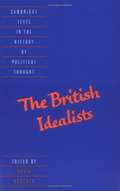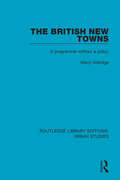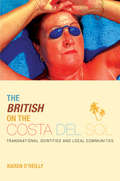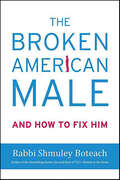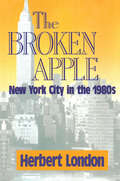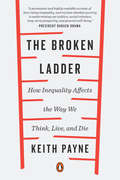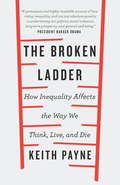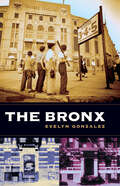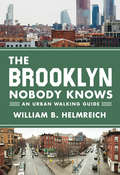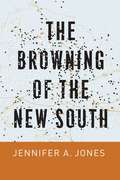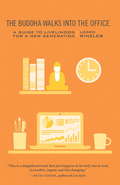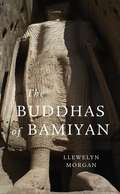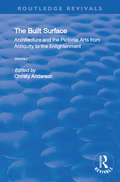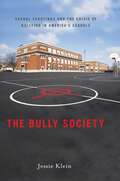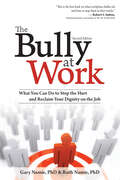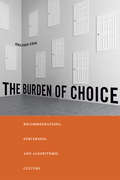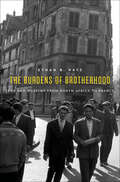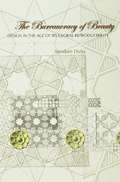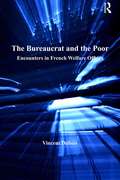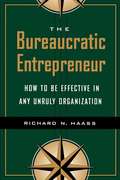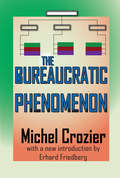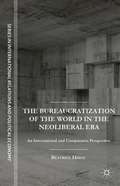- Table View
- List View
The British Idealists
by David BoucherThe British idealists made significant and lasting contributions to the social and political thought of the nineteenth century. They contributed to the evolution debate in insisting that the social organism could not be understood in naturalistic terms, but instead had to be conceived as an evolving spiritual unity. In this respect the British idealists developed a distinctive view of the state constitutive of the individual and they are commonly acknowledged as the forerunners of modern communitarian theory. Furthermore the idealists contributed to the major debates of their day, including evolution, democracy, the role of the state, education and international relations. In his introduction, David Boucher develops the themes illustrated in the writings of the British idealists. This volume also contains biographies of the British idealists which incorporate their principal works.
The British Industrial Revolution in Global Perspective
by Robert C. AllenWhy did the industrial revolution take place in eighteenth-century Britain and not elsewhere in Europe or Asia? In this convincing new account Robert Allen argues that the British industrial revolution was a successful response to the global economy of the seventeenth and eighteenth centuries. He shows that in Britain wages were high and capital and energy cheap in comparison to other countries in Europe and Asia. As a result, the breakthrough technologies of the industrial revolution - the steam engine, the cotton mill, and the substitution of coal for wood in metal production - were uniquely profitable to invent and use in Britain. The high wage economy of pre-industrial Britain also fostered industrial development since more people could afford schooling and apprenticeships. It was only when British engineers made these new technologies more cost-effective during the nineteenth century that the industrial revolution would spread around the world.
The British New Towns: A Programme without a Policy (Routledge Library Editions: Urban Studies #1)
by Meryl AldridgeFirst published in 1979. Concern about the processes at work in Britain’s urban areas, coupled with steep declines in the population projections, led to a review of urban and regional policies in the mid-1970s, with major implications for the new towns as an element of national policy. The various stages and the conclusions of this re-appraisal are discussed, and the new towns’ role in the supposed ‘urban crisis’ is analysed. This title will be of interest to students of urban studies and development.
The British on The Costa Del Sol: Transnational Identities And Local Communities
by Karen O'Reilly'Brits in Spain' first achieved notoriety during the 1980s - popularly imagined as a group made up of exiled criminals, drunken hooligans and leathery looking pensioners - welcome to 'Little England'! The British on the Costa Del Sol is the very first book to study this British expatriate community in any great depth and, through use of interviews with members of this community, paints a far more complex picture of its members. In doing so the author explodes the popularly held stereotype of 'Brits in Spain'. What emerges is a rich account of who migrates, their reasons for migration and the day to day realities of expatriate life.
The Broken American Male: And How to Fix Him
by Shmuley BoteachA noted relationship counselor explores the twenty-first–century problems driving men and their families apart, offering guidance to restore their lives and love.Why do American husbands come home from work too exhausted to interact with their families? When did a healthy quest for prosperity become a twisted game no one can win? How did smartphones and internet porn become more interesting to men than their flesh-and-blood spouses?Shmuley Boteach has made a great study of how families live today—both in his work as a rabbi privately and as host of TLC's Shalom in the Home. He's discovered a disturbing common thread in the families he meets: men responding to the pressure of competition in their work lives by turning away from their loved ones. In a world that judges men by the size of their paychecks and the wattage of their fame, it's all too easy to lose sight of what is truly valuable in life. Men who consider themselves failures and don't love themselves turn into stressed-out dads, distracted husbands and miserable human beings. For these men, alcohol, the internet and sporting events serve as numbing stand-ins for real life.In The Broken American Male, Boteach doesn't just outline the problems facing marriages and nuclear families. He also offers practical, inspiring solutions, showing how wives can reach out to their husbands, helping them become heroes again to their own families.“A vital and fascinating repair manual.” —A.J. Jacobs, author of The Year of Living Constitutionally“A refreshing kick in the teeth.” —USA Today“Boteach's lessons are applicable to anyone hoping to understand and overcome feelings of failure in themselves or their loved ones.” —Publishers Weekly
The Broken Apple: New York City in the 1980's
by Herbert I. LondonOn the brink of bankruptcy in the 1970s, New York City has been restored as a center of economic and cultural vitality in the 1980s. But it has also become an increasingly brutal place, where incivility reigns, drugs lace the streets, and crime is so pervasive that most New Yorkers now consider it a permanent fixture, like gray skies and impossible traffic. What is it that continues to draw people to this city of contradictions?Born and educated in New York, Herbert London knows this city of dreams as few do. The Broken Apple is based on his keen observations of New York's social, political, and cultural life over the critical decade of the 1980s. London examines the city's continuing failures, including a city administration unable to meet the most basic citizen needs or to assure safety and security. He sees schools that have become mean-spirited, with teachers unable to teach, administrators unable to maintain order, and students unable to learn. He describes the new slaves of New York as those in search of a place to live, in a city where housing is in shorter supply than in any other major city in the nation. London asks why, despite all this, everything is bigger than life in New York, and finds the answer in New York's role as the nation's communications hub and the measuring rod by which other cities are judged.London writes with knowledgeable affection about this very special place, where the mundane is freely converted into the metaphorical. His book is an excursion, a guide to what is good, what is bad, and what is awful in the city. It is a montage of the years of Mayor Koch, the period many have described as the city's fin de siecle. But it is also a perscriptive book, pointing out what can be done in practical ways to improve life.The Broken Apple will be of interest to urban specialists as well as those for whom New York is an aspiration or a reality. Like the city itself, the book has something for everyone, from visions of political corruption to acts of redemption. Above all, it captures the pulsating rhythm of this unique city
The Broken Ladder: How Inequality Affects the Way We Think, Live, and Die
by Keith PayneA timely examination by a leading scientist of the physical, psychological, and moral effects of inequality. Today’s inequality is on a scale that none of us has seen in our lifetimes, yet this disparity between rich and poor has ramifications that extend far beyond mere financial means. In The Broken Ladder psychologist Keith Payne examines how inequality divides us not just economically, but has profound consequences for how we think, how our cardiovascular systems respond to stress, how our immune systems function, and how we view moral ideas like justice and fairness. Experiments in psychology, neuroscience, and behavioral economics have not only revealed important new insights on how inequality changes people in predictable ways, but have provided a corrective to our flawed way of viewing poverty as the result of individual character failings. Among modern, developed societies, economic inequality is not primarily about money, but rather about relative status: where we stand in relation to other people. Regardless of their average income, countries or states with greater levels of income inequality have much higher rates of all the social problems we associate with poverty, including lower average life expectancies, serious health issues, mental illness, and crime. The Broken Ladder explores such issues as why women in poor societies often have more children, and have them younger; why there is little trust among the working class that investing for the future will pay off; why people’s perception of their relative social status affects their political beliefs, and why growing inequality leads to greater political divisions; how poverty raises stress levels in the same way as a physical threat; inequality in the workplace, and how it affects performance; why unequal societies become more religious; and finally offers measures people can take to lessen the harm done by inequality in their own lives and the lives of their children.
The Broken Ladder: How Inequality Changes the Way We Think, Live and Die
by Dr Keith Payne'A persuasive and highly readable account of how rising inequality, and not just absolute poverty, is undermining our politics, social cohesion, long-term prosperity and general well-being' Barack ObamaInequality makes us feel poor and act poor, even when we're not. It affects our mood, decision-making and even our immune systems. Using groundbreaking research in psychology and neuroscience, Keith Payne explains how inequality shapes our world and influences our thinking, how we perform at work and respond to stress - and what we can do to combat its most insidious effects on our lives.'Eye-opening' Susan Cain, author of Quiet'Important, timely and beautifully written' Adam Atler, author of Irresistible
The Bronx (Columbia History of Urban Life)
by Evelyn GonzalezThe rise and fall and rise of the South Bronx: &“A thoughtful story of urbanization in a place that most Americans know only stereotypically.&” —American Historical Review Home to the New York Yankees, the Bronx Zoo, and the Grand Concourse, the Bronx was at one time a haven for upwardly mobile second-generation immigrants eager to leave the crowded tenements of Manhattan in pursuit of the American dream. Once hailed as a &“wonder borough&” of beautiful homes, parks, and universities, the Bronx became—during the 1960s and 1970s—a national symbol of urban deterioration. Thriving neighborhoods that had long been home to generations of families dissolved under waves of arson, crime, and housing abandonment, turning blocks of apartment buildings into gutted, graffiti-covered shells and empty, trash-filled lots. In this revealing history of the Bronx, Evelyn Gonzalez describes how the once-infamous New York City borough underwent one of the most successful and inspiring community revivals in American history. From its beginnings as a loose cluster of commuter villages to its current status as a densely populated home for New York&’s growing and increasingly diverse African American and Hispanic populations, this book shows how the Bronx interacted with and was affected by the rest of New York City as it grew from a small colony on the tip of Manhattan into a sprawling metropolis. This is the story of the clattering of elevated subways and the cacophony of crowded neighborhoods, the heady optimism of industrial progress and the despair of economic recession, and the vibrancy of ethnic cultures and the resilience of local grassroots coalitions crucial to the borough&’s rejuvenation. &“Gonzalez&’s reporting and research are excellent, and scholars will appreciate the extensive bibliography.&” —Library Journal
The Brooklyn Nobody Knows: An Urban Walking Guide
by William B. HelmreichBill Helmreich walked every block of New York City—6,000 miles in all—to write the award-winning The New York Nobody Knows. Now he has re-walked Brooklyn—some 816 miles—to write this one-of-a-kind walking guide to the city's hottest borough. Drawing on hundreds of conversations he had with residents during his block-by-block journeys, The Brooklyn Nobody Knows captures the heart and soul of a diverse, booming, and constantly changing borough that defines cool around the world. The guide covers every one of Brooklyn’s forty-four neighborhoods, from Greenpoint to Coney Island, providing a colorful portrait of each section’s most interesting, unusual, and unknown people, places, and things. Along the way you will learn about a Greenpoint park devoted to plants and trees that produce materials used in industry; a hornsmith who practices his craft in Prospect-Lefferts Gardens; a collection of 1,140 stuffed animals hanging from a tree in Bergen Beach; a five-story Brownsville mural that depicts Zionist leader Theodor Herzl—and that was the brainchild of black teenagers; Brooklyn’s most private—yet public—beach in Manhattan Beach; and much, much more. An unforgettably vivid chronicle of today’s Brooklyn, the book can also be enjoyed without ever leaving home—but it’s almost guaranteed to inspire you to get out and explore one of the most fascinating urban areas anywhere.Covers every one of Brooklyn’s 44 neighborhoods, providing a colorful portrait of their most interesting, unusual, and unknown people, places, and thingsEach neighborhood section features a brief overview and history; a detailed, user-friendly map keyed to the text; and a lively guided walking tourDraws on the author’s 816-mile walk through every Brooklyn neighborhoodIncludes insights from conversations with hundreds of residents
The Browning of the New South
by Jennifer A. JonesStudies of immigration to the United States have traditionally focused on a few key states and urban centers, but recent shifts in nonwhite settlement mean that these studies no longer paint the whole picture. Many Latino newcomers are flocking to places like the Southeast, where typically few such immigrants have settled, resulting in rapidly redrawn communities. In this historic moment, Jennifer Jones brings forth an ethnographic look at changing racial identities in one Southern city: Winston-Salem, North Carolina. This city turns out to be a natural experiment in race relations, having quickly shifted in the past few decades from a neatly black and white community to a triracial one. Jones tells the story of contemporary Winston-Salem through the eyes of its new Latino residents, revealing untold narratives of inclusion, exclusion, and interracial alliances. The Browning of the New South reveals how one community’s racial realignments mirror and anticipate the future of national politics.
The Buddha Walks into the Office
by Lodro RinzlerFrom the author of the best-selling Buddha Walks into a Bar . . . , wisdom for "Generation Next" on how to make your work meaningful, satisfying, and of benefit to others. Does it ever seem that a lot of the people you work with are, well, jerks? This book is about how not to let work turn you into one of them. Apply the simple Buddhist teachings and practices Lodro Rinzler provides here to whatever you do for a living, and you'll not only avoid jerk-hood, but you'll be setting out on the path toward making your livelihood an expression of your inherent wisdom, honesty, and compassion. You'll discover practical ways to bring mindfulness into administrative support, cabinet-making, financial management, nursing, truck-driving, or latté-brewing. In the process, you'll discover genuine empathy for the folks you once found so difficult. You'll also learn leadership skills that apply compassion to management in a way that increases happiness along with efficiency. This is career advice of the profoundest kind, geared toward today's twenty- and thirty-something workers and job-seekers whose employment outlook is radically different from that of a generation ago. As Lodro shows, even if the path of work shifts beneath your feet, it's possible to make your livelihood a source of satisfaction and of deep meaning.
The Buddhas of Bamiyan
by Llewelyn MorganFor 1,400 years, two colossal figures of the Buddha overlooked the fertile Bamiyan Valley on the Silk Road in Afghanistan. Witness to a melting pot of passing monks, merchants, and armies, the Buddhas embodied the intersection of East and West, and their destruction by the Taliban in 2001 provoked international outrage. Llewelyn Morgan excavates the layers of meaning these vanished wonders hold for a fractured Afghanistan. Carved in the sixth and seventh centuries, the Buddhas represented a confluence of religious and artistic traditions from India, China, Central Asia, and Iran, and even an echo of Greek influence brought by Alexander the Great’s armies. By the time Genghis Khan destroyed the town of Bamiyan six centuries later, Islam had replaced Buddhism as the local religion, and the Buddhas were celebrated as wonders of the Islamic world. Not until the nineteenth century did these figures come to the attention of Westerners. That is also the historical moment when the ground was laid for many of Afghanistan’s current problems, including the rise of the Taliban and the oppression of the Hazara people of Bamiyan. In a strange twist, the Hazaras-descendants of the conquering Mongol hordes who stormed Bamiyan in the thirteenth century-had come to venerate the Buddhas that once dominated their valley as symbols of their very different religious identity. Incorporating the voices of the holy men, adventurers, and hostages throughout history who set eyes on the Bamiyan Buddhas, Morgan tells the history of this region of paradox and heartache.
The Built Surface: v. 1: Architecture and the Visual Arts from Antiquity to the Enlightenment (Routledge Revivals)
by Christy Anderson Karen KoehlerThis title was first published in 2002: Since antiquity through to the present, architecture and the pictorial arts (paintings, photography, graphic arts) have not been rigidly separated but interrelated - the one informing the other, and establishing patterns of creation and reception. In the Classical tradition the education of the architect and artist has always stressed this relationship between the arts, although modern scholarship has too often treated them as separate disciplines. These volumes explore the history of this exchange between the arts as it emerged from classical theory into artistic and architectural practice. Issues of visual representation, perspective, allegory, site specificity, ornamentation, popular culture, memorials, urban and utopian planning, and the role of treatises, manifestos, and other theoretical writings are addressed, as well as the critical reaction to these products and practices. This title represents a variety of methods, approaches, and diatectical interpretations - cases where architecture informs the themes and physical space of pictures, or pictorial concerns inform the design and construction of the built environment. The exchanges between architecture and pictures explored by these authors are found to be in all cases ideologically potent, and therefore significantly expressive of their respective social, political, and intellectual histories.
The Bulldozer in the Countryside
by Adam RomeThe Bulldozer in the Countryside is the first scholarly history of efforts to reduce the environmental costs of suburban development in the United States. The book offers a new account of two of the most important historical events in the period since World War II--the mass migration to the suburbs and the rise of the environmental movement. This work offers a valuable historical perspective for scholars, professionals, and citizens interested in the issue of suburban sprawl.
The Bully Society: School Shootings and the Crisis of Bullying in America’s Schools (Intersections #6)
by Jessie KleinChoice's Outstanding Academic Title list for 2013 Through interviews and case studies, Klein develops an explanation for bully behavior in America's schoolsIn today’s schools, kids bullying kids is not an occasional occurrence but rather an everyday reality where children learn early that being sensitive, respectful, and kind earns them no respect. Jessie Klein makes the provocative argument that the rise of school shootings across America, and childhood aggression more broadly, are the consequences of a society that actually promotes aggressive and competitive behavior. The Bully Society is a call to reclaim America’s schools from the vicious cycle of aggression that threatens our children and our society at large.Heartbreaking interviews illuminate how both boys and girls obtain status by acting “masculine”—displaying aggression at one another’s expense as both students and adults police one another to uphold gender stereotypes. Klein shows that the aggressive ritual of gender policing in American culture creates emotional damage that perpetuates violence through revenge, and that this cycle is the main cause of not only the many school shootings that have shocked America, but also related problems in schools, manifesting in high rates of suicide, depression, anxiety, eating disorders, self-cutting, truancy, and substance abuse. After two decades working in schools as a school social worker and professor, Klein proposes ways to transcend these destructive trends—transforming school bully societies into compassionate communities.
The Bully at Work: What You Can Do to Stop the Hurt and Reclaim Your Dignity on the Job
by Gary Namie Ruth NamieA landmark book that blazed light on one of the business world's dirtiest secrets, The Bully at Work exposed the destructive, silent epidemic of workplace bullying that devastates the lives, careers, and families of millions. In this completely updated new edition based on an updated survey of workplace issues, the authors explore new grounds of bullying in the 21st century workplace. Gary and Ruth Namie, pioneers of the Campaign Against Workplace Bullying, teach the reader personal strategies to identify allies, build their confidence, and stand up to the tormentor - or decide when to walk away with their sanity and dignity intact. The Namies' expertise on workplace bullying has been featured in such media outlets as The Early Show, CBS Radio, The Howard Stern Show, CNN, PBS, NPR, USA Today, and theWashington Post.
The Burden of Choice: Recommendations, Subversion, and Algorithmic Culture
by Jonathan CohnThe Burden of Choice examines how recommendations for products, media, news, romantic partners, and even cosmetic surgery operations are produced and experienced online. Fundamentally concerned with how the recommendation has come to serve as a form of control that frames a contemporary American as heteronormative, white, and well off, this book asserts that the industries that use these automated recommendations tend to ignore and obscure all other identities in the service of making the type of affluence they are selling appear commonplace. Focusing on the period from the mid-1990s to approximately 2010 (while this technology was still novel), Jonathan Cohn argues that automated recommendations and algorithms are far from natural, neutral, or benevolent. Instead, they shape and are shaped by changing conceptions of gender, sexuality, race, and class. With its cultural studies and humanities-driven methodologies focused on close readings, historical research, and qualitative analysis, The Burden of Choice models a promising avenue for the study of algorithms and culture.
The Burdens of Brotherhood: Jews and Muslims from North Africa to France
by Ethan B. KatzAn informative look at the ever-changing relationship between France’s predominant non-Christian immigrant minorities over the course of 100 years.Headlines from France suggest that Muslims have renewed an age-old struggle against Jews and that the two groups are once more inevitably at odds. But the past tells a different story. The Burdens of Brotherhood is a sweeping history of Jews and Muslims in France from World War I to the present. Here Ethan Katz introduces a richer and more complex world that offers fresh perspective for understanding the opportunities and challenges in France today.Focusing on the experiences of ordinary people, Katz shows how Jewish–Muslim relations were shaped by everyday encounters and by perceptions of deeply rooted collective similarities or differences. We meet Jews and Muslims advocating common and divergent political visions, enjoying common culinary and musical traditions, and interacting on more intimate terms as neighbors, friends, enemies, and even lovers and family members. Drawing upon dozens of archives, newspapers, and interviews, Katz tackles controversial subjects like Muslim collaboration and resistance during World War II and the Holocaust, Jewish participation in French colonialism, the international impact of the Israeli–Arab conflict, and contemporary Muslim antisemitism in France.We see how Jews and Muslims, as ethno-religious minorities, understood and related to one another through their respective relationships to the French state and society. Through their eyes, we see colonial France as a multiethnic, multireligious society more open to public displays of difference than its postcolonial successor. This book thus dramatically reconceives the meaning and history not only of Jewish–Muslim relations but ultimately of modern France itself.Praise for The Burdens of BrotherhoodWinner of the American Library in Paris Book AwardWinner of the J. Russell Major Prize for the Best Book in French HistoryWinner of the 2015 National Jewish Book Award for Writing Based on Archival MaterialWinner of the 2016 David H. Pinkney Prize for the Best Book in French History“A compelling, important, and timely history of Jewish/Muslim relations in France since 1914 that investigates the ways and venues in which Muslims and Jews interacted in metropolitan France . . . This insightful, well-researched, and elegantly written book is mandatory reading for scholars of the subject and for those approaching it for the first time.” —J. Haus, Choice
The Burdens of Proof
by Dale A. NanceAdjudicative tribunals in both criminal and non-criminal cases rely on the concept of the 'burden of proof' to resolve uncertainty about facts. Perhaps surprisingly, this concept remains clouded and deeply controversial. Written by an internationally renowned scholar, this book explores contemporary thinking on the evidential requirements that are critical for all practical decision-making, including adjudication. Although the idea that evidence must favor one side over the other to a specified degree, such as 'beyond reasonable doubt', is familiar, less well-understood is an idea associated with the work of John Maynard Keynes, namely that there are requirements on the total amount of evidence considered to decide the case. The author expertly explores this distinct Keynesian concept and its implications. Hypothetical examples and litigated cases are included to assist understanding of the ideas developed. Implications include an expanded conception of the burden of producing evidence and how it should be administered.
The Bureaucracy of Beauty: Design in the Age of its Global Reproducibility
by Arindam DuttaThe Bureaucracy of Beauty is a wide-ranging work of cultural theory that connects literary studies, postcoloniality, the history of architecture and design, and the history and present of empire. Professor Ananya Roy of UC Berkeley calls it a "fantastic book," and in many ways this is the best description of it. The Bureaucracy of Beauty begins with nineteenth-century Britain's Department of Science and Arts, a venture organized by the Board of Trade, and how the DSA exerted a powerful influence on the growth of museums, design schools, and architecture throughout the British Empire. But this is only the book's literal subject: in a remarkable set of chapters, Dutta explores the development of international laws of intellectual property, ideas of design pedagogy, the technological distinction between craft and industry, the relation of colonial tutelage to economic policy, the politics and technology of exhibition, and competing philosophies of aesthetics. His thinking across these areas is ignited by engagements with Benjamin, Marx, Adam Smith and Jeremy Bentham, Kant, Mill, Ruskin, and Gandhi. A rich study in the history of ideas, of design and architecture, and of cultural politics, The Bureaucracy of Beauty converges on the issues of present-day globalization. From nineteenth-century Britain to twenty-first century America, The Bureaucracy of Beauty offers a theory of how things - big things -change.
The Bureaucrat and the Poor: Encounters in French Welfare Offices
by Vincent DuboisWelfare offices usually attract negative descriptions of bureaucracy with their queues, routines, and impersonal nature. Are they anonymous machines or the locus of neutral service relationships? Showing how people experience state public administration, The Bureaucrat and the Poor provides a realistic view of French welfare policies, institutions and reforms and, in doing so, dispels both of these myths. Combining Lipsky's street-level bureaucracy theory with the sociology of Bourdieu and Goffman, this research analyses face-to-face encounters and demonstrates the complex relationship between welfare agents, torn between their institutional role and their personal feelings, and welfare applicants, required to translate their personal experience into bureaucratic categories. Placing these interactions within the broader context of social structures and class, race and gender, the author unveils both the social determinations of these interpersonal relationships and their social functions. Increasing numbers of welfare applicants, coupled with mass unemployment, family transformations and the so-called 'integration problem' of migrants into French society deeply affect these encounters. Staff manage tense situations with no additional resources - some become personally involved, while others stick to their bureaucratic role; most of them alternate between involvement and detachment, assistance and domination. Welfare offices have become a place for 're-socialisation', where people can talk about their personal problems and ask for advice. On the other hand, bureaucratic encounters are increasingly violent, symbolically if not physically. More than ever, they are now a means of regulating the poor.
The Bureaucratic Entrepreneur: How to Be Effective in Any Unruly Organization
by Richard N. HaassHaass (vice president and director, Foreign Policy Studies program at the Brookings Institution) provides guidelines on how to manage relationships, set goals, and translate them into success. His insights into delicate working relationships will benefit those in government, the corporate world, and the non-profit sector, as well as students of public administration and business. This is a revised edition of Houghton Mifflin, 1994. This edition includes anecdotes from the Clinton administration. Annotation c. Book News, Inc., Portland, OR (booknews.com)
The Bureaucratic Phenomenon
by Wesley MitchellIn The Bureaucratic Phenomenon Michel Crozier demonstrates that bureaucratic institutions need to be understood in terms of the cultural context in which they operate. The originality of the study lies in its association of two widely different approaches: the theory of decision-making in large organizations and the cultural analysis of social patterns of action.The book opens with a detailed examination of two forms of French public service. These studies show that professional training and distortions alone cannot ex plain the rise of routine behavior and dysfunctional vicious circles. The role of various bureaucratic systems appears to depend on the pattern of power relation ships between groups and individuals. Crozier's findings lead him to the view that bureaucratic structures form a necessary protection against the risks inherent in collective action.Since systems of protection are built around basic cultural traits, the author presents a French bureaucratic model based on centralization, strata isolation, and individual sparkle-one that that can be contrasted with an American, Russian, or Japanese model. He points out how the same patterns can be found in several areas of French life: education, industrial relations, politics, business, and the colonial policy. Bureaucracy, Crozier concludes, is not a modern disease resulting from organizational progress but rather a bulwark against development. The breakdown of the traditional bureaucratic system in modern France offers hope for new and fruitful forms of action.
The Bureaucratization of the World in the Neoliberal Era: An International and Comparative Perspective (The Sciences Po Series in International Relations and Political Economy)
by Béatrice HibouContemporary bureaucracy is a set of norms, rules, procedures, and formalities which includes administration, business, and NGOs. Where Max Weber meets Michel Foucault, Béatrice Hibou analyzes the political dynamics underlying this process. Neoliberal bureaucracy is a vector of discipline and control, producing social and political indifference.
